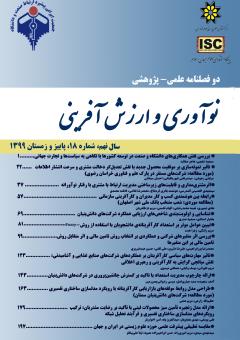رابطه بین هوشمندی کسب و کار مدیران و کارآفرینی سازمانی (مطالعه موردی: شعب منتخب بانک ملی شهر اصفهان)
محورهای موضوعی : عمومىهادی تیموری 1 * , نعیمه محمدرضایی 2 , الهام قاسمی 3 , مریم دژطاهریان 4
1 - دانشیار گروه مدیریت، دانشکده علوم اداری و اقتصاد، دانشگاه اصفهان، اصفهان، ایران
2 - کارشناس ارشد مدیریت اجرایی، دانشکده مجازی، دانشگاه اصفهان، اصفهان، ایران
3 - کارشناس ارشد مدیریت اجرایی، دانشکده مجازی دانشگاه اصفهان، اصفهان، ایران
4 - دانشجوی دکتری مدیریت صنعتی، دانشکده علوم اداری و اقتصاد، دانشگاه اصفهان، اصفهان، ايران
کلید واژه: هوشمندي کسب وکار, کارآفرینی سازمانی, بانک ملی اصفهان,
چکیده مقاله :
بدون شک هوش کسبوکار رويکردي نوين در کسبوکار و معماری سازمان است که دسترسي سريع به داده ها و تحليل آن ها را بر اساس نياز هاي کاربران فراهم مي نمايد. از سوی دیگر کارآفرینی نقش بسيار کليدي در توسعه ي اقتصادي و پايداری همه جوامع دارد. بهطوریکه امروزه يکي از شاخص هاي توسعه در کشورهاي رو به رشد محسوب مي شود. هدف از این پژوهش تحلیل رابطه ی هوشمندی کسبوکار بر کارآفرینی سازمانی در شعب منتخب بانک ملی در شهر اصفهان است. جامعه ی آماری که به روش نمونه گیری طبقهای تصادفی انتخاب شدند، شامل200 نفر از کارشناسان و مدیران شعب بانک ملی میباشد که از این تعداد، دادههای حاصل از پرسشنامهی تکمیل شده توسط140 نفر بهعنوان نمونه پژوهش در نظر گرفته شد. جهت تجزیهوتحلیل داد-های حاصل، از نرمافزارهای Amos و Spss استفاده شد. نتایج حاصل از این پژوهش حاکی از این واقعیت است که هوشمندی کسبوکار مدیران تأثیر بسزایی بر کارآفرینی سازمان دارد. طبق یافته های پژوهش، بانک ملی برای ادامه حیات خود و افزایش توان کارآفرینی سازمانی، باید هوشمندی کسبوکار خود را افزایش دهد.
Undoubted the business intelligence is the new approach to business and organizational architectures that provides quick access to data and analyze them based on users. Another aspect entrepreneurship is a key role in developing the economy and stability of all societies. So that today an indicator of the growing development in numerous countries. Therefore, the present study aims to explore the relationship between business intelligence and organizational entrepreneurship from the viewpoint of managers and employees of Melli Bank of Isfahan. A stratified random sampling method was used and a sample size of 140 was chosen from among 200 persons. The collected data was analyzed via SPSS and AMOS software. The results of this study reflect the reality that business intelligence managers have a significant impact on organizational entrepreneurship.
1. الوانی، س- م. (1385). مدیریت عمومی. تهران: نشر نی.
2. سعیدی مهرآباد، م. مهتدی، م- م. (1378). تاثیر آموزش کارآفرینی بر توسعه رفتارهای کارآفرینانه (مطالعه موردی: آموزش¬های کارآفرینی وزارت کار و امور اجتماعی)، توسعه کارآفرینی، 72-57.
3. Banerjeea, M. Mishrab, M.(2015).Retail supply chain management practices in India: A business intelligence perspective, Journal of Retailing and Consumer Services, In press.
4. Chung, W. Tseng, T. (2012). Discoverring business intelligence from online product reviews:A rule-induction framework, Expert Systems with Applications 39,11870-11879.
5. Foshay , N. and Kuziemsky ,C.(2014). Towards an implantation framework for business intelligence, international jornal of information management, 34(1);20-27.
6. Ghazanfari, M. Jafari, M .Rouhani, S. (2011). A tool to evaluate the business intelligence of enterprise systems,ScientiaIranica E , 18(6) , 1579-1590.
7. Howston, C. (2008). Successful business intelligence: secret to making BI a killer app. 1th edition, The McGraw-Hill companies, 244 p.
8. Kowalczyk, M. Buxmann, P.(2015). An ambidextrous perspective on business intelligence and analytics support in decision processes: insights from a multiple case study. Decision support systems. Volume 80. 1-13.
9. Kubina, M. Koman, G. Kubinova, I. (2015). Possibility of improving efficiency within business intelligence systems in companies. Procedia Economics and Finance. 300-305.
10. Mosavi Rad, T. Farahani, A. Nejat Isfahani , A. Honari, H. (2012). Desining the model of corporate entrepreneurship based on the relationship between corporate strategy and dimension of corporate entrepreneurial orientation in physical education organization exercise management; 4(12): 201-217 (In Persian).
11. Shankha Chakraborty, J.Thompson, Etienne B.Yehoue. (2016). The culture of entrepreneurship. Journal of economic theory. In press.
12. Wang, C-H. (2016). A novel approach to conduct the importance-satisfaction analysis for acquiring typical user groups in business-intelligence systems, Computers in Human Behavior,54, 673–681.

